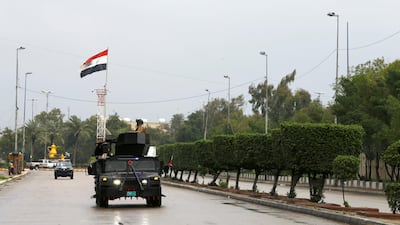Iraq needs to refocus the country's political system towards the development of its private sector to overcome its socio-economic challenges and to strengthen its formal institutions to restore authority over non-state actors, according to the World Bank.
In a study, Breaking Out of Fragility, The Washington-based lender argues that the country needs to strengthen the management and allocation of its oil wealth and improve accountability so that its leaders can effectively respond to public concerns about corruption.
Iraq's economy is set to shrink 9.7 per cent this year, its worst performance since the fall of Saddam Hussein's regime, the World Bank said in the 175-page report.
“Given current oil prices and the persistent drop in global demand for oil because of the Covid-19 pandemic, the country will have a tough time addressing the needs of its people in the short term,” the World Bank said. “It can, however, embark on a long but much-needed path toward structural transformation and reform, one that could leave its economy less dependent on oil and more driven by private sector activity.”
Iraq’s growth path over the past four decades has been characterised by conflict, political instability, and oil price volatility. These periods include the conflict with Iran (pre-1990), former president Saddam Hussein's regime and an international sanctions period from 1990 to 2003, the new regime starting in 2004 (2004–14), and the Islamic State of Iraq and the Levant attacks alongside the oil price collapse in 2014.
Iraq is the world’s sixth-largest oil producer and the world’s third-largest oil exporter. In 2019, it exported about 4 million barrels of oil per day of the estimated 4.7 million barrels per day it produced. Over the past decade, Iraq’s hydrocarbon sector has accounted for more than 95 per cent of the country’s exports, provided 90 percent of government revenues and 57 percent of its gross domestic product.
"Iraq is on the brink of catastrophe. Almost two decades after the Iraq war began, the country remains caught in a fragility trap and faces increasing political instability and fragmentation, geopolitical risks, growing social unrest, and a deepening divide between the state and its citizens," the World Bank report said. "The impact of the Covid-19 crisis and the crash in oil prices compound Iraq’s pre-existing fragilities and could lead to economic meltdown and a new cycle of violence and conflict – or they could provide an opportunity to fundamentally realign the government’s priorities, advance much-needed reforms and tackle the deep structural issues that hold back progress."
Iraq’s current power-sharing system has resulted in widespread corruption and has reinforced competition over oil rents while giving few incentives to build accountable institutions, diversify economically, or deliver benefits to the Iraqi people. Even before the outbreak of the pandemic, youth unemployment stood at 36 per cent in Iraq in 2018, the report said.
Although oil wealth has allowed Iraq to obtain upper-middle-income status, in many ways its institutions and socioeconomic outcomes more closely resemble those of a low-income, fragile country, The World Bank said.
The Iraqi education system once ranked near the top of the Middle East and North Africa (MENA) region, but now sits
near the bottom. Iraq’s rate of participation in the economy is also low, and the country has one of the lowest female labour force participation rates in the world, low levels of human and physical capital, and deteriorating business conditions.
Iraq also has one of the highest poverty rates among upper-middle income countries.
Without key reforms in these areas, the country will find it increasingly difficult to grow sustainably and equitably and to sustain its standard of living.
Since October last year, thousands of Iraqis have taken to the streets to demand the replacement of the political system that has left public services crumbling and led to widespread corruption. The protests led to the resignation of prime minister Adel Abdul Mahdi last year. Mustafa Al Kadhimi, who was elected as prime minister in May, vowed to implement reforms to root out corruption and stabilise the economy.
"Three areas of focus can help lead to economic diversification, growth and stability," the World Bank said.
"First, maintaining peace can, by itself, be a strong driver of growth. Iraq’s per capita gross domestic product was around 18 to 21 per cent lower in 2018 than it would have been if not for the conflict beginning in 2014, and Iraq’s non-oil GDP is one-third lower than it would have been without conflict.
“Second, Iraq has latent export potential (for a variety of goods) that, if realised, can diversify the country’s economy, raise its living standards and boost its economic resilience. Under the right conditions, including the return of domestic security, Iraq’s trade policy can be reformed in a way that brings better prices and quality for consumers.”
Reforming Iraq’s import licensing regime and unifying the Iraqi customs territory under a single tariff schedule could also go a long way toward improving economic performance, it added.
The World Bank also said agriculture in Iraq can be “unwound from its decades-long decline to serve as a pillar of Iraq’s vision of a more diversified and private sector–led economy”.
Agricultural production, food processing, and support services such as logistics, finance, manufacturing, and technology all have great potential to expand and create jobs.
If Iraq had the same levels of labour force participation, investment, human capital and productivity as many of its peers, the country's GDP could be up to 60 per cent higher, the report said.


